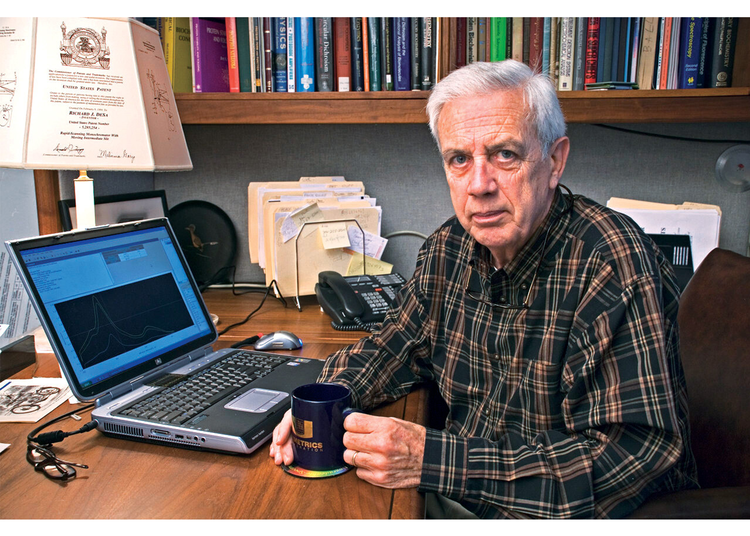What Does Uv/vis Do?

Branch of spectroscopy Table-top spectrophotometer Beckman IR-1 Spectrophotometer, ca. 1941 Beckman Model DB Spectrophotometer (a double beam model), 1960 Hand-held spectrophotometer utilized in graphic market Spectrophotometry is a branch of electro-magnetic spectroscopy worried about the quantitative measurement of the reflection or transmission properties of a material as a function of wavelength.
Spectrophotometry is a tool that hinges on the quantitative analysis of molecules depending on how much light is taken in by colored compounds.
Uv/vis/nir Things To Know Before You Buy
A spectrophotometer is commonly used for the measurement of transmittance or reflectance of solutions, transparent or nontransparent solids, such as polished glass, or gases. Numerous biochemicals are colored, as in, they soak up visible light and therefore can be measured by colorimetric procedures, even colorless biochemicals can frequently be converted to colored compounds suitable for chromogenic color-forming responses to yield compounds ideal for colorimetric analysis.: 65 Nevertheless, they can also be developed to measure the diffusivity on any of the noted light varieties that typically cover around 2002500 nm using various controls and calibrations.
An example of an experiment in which spectrophotometry is used is the decision of the stability constant of an option. A specific chemical reaction within an option may occur in a forward and reverse direction, where reactants form items and items break down into reactants. At some point, this chemical response will reach a point of balance called a balance point.
An Unbiased View of Uv/vis/nir
The quantity of light that passes through the solution is a sign of the concentration of specific chemicals that do not enable light to go through. The absorption of light is because of the interaction of light with the electronic and vibrational modes of particles. Each kind of particle has a private set of energy levels related to the makeup of its chemical bonds and nuclei and thus will take in light of particular wavelengths, or energies, leading to distinct spectral residential or commercial properties.
Making use of spectrophotometers spans various scientific fields, such as physics, products science, chemistry, biochemistry. UV/Vis/NIR, chemical engineering, and molecular biology. They are commonly used in many industries including semiconductors, laser and optical manufacturing, printing and forensic examination, along with in laboratories for the study of chemical substances. Spectrophotometry is often used in measurements of enzyme activities, determinations of protein concentrations, decisions of enzymatic kinetic constants, and measurements of ligand binding reactions.: 65 Ultimately, a spectrophotometer is able to identify, depending upon the control or calibration, what substances exist in a target and exactly how much through calculations of observed wavelengths.
This would come as a solution to the previously produced spectrophotometers which were unable to soak up the ultraviolet properly.
Rumored Buzz on Circularly Polarized Luminescence
It would be discovered that this did not offer satisfactory outcomes, for that reason in Design B, there was a shift from a glass to a quartz prism which permitted better absorbance outcomes - UV/Vis/NIR (https://www.wattpad.com/user/olisclarity1). From there, Model C was born with a modification to the wavelength resolution which ended up having three systems of it produced
It irradiates the sample with polychromatic light which the sample absorbs depending on its homes. It is transferred back by grating the photodiode array which spots the wavelength area of the spectrum. Since then, the creation and application of spectrophotometry devices has increased immensely and has actually become one of the most innovative instruments of our time.

6 Simple Techniques For Circularly Polarized Luminescence
The grating can either be movable or repaired.
In such systems, the grating is repaired and the intensity of each wavelength of light read here is determined by a various detector in the range. Furthermore, most modern-day mid-infrared spectrophotometers utilize a Fourier transform technique to obtain the spectral info - http://www.askmap.net/location/6824320/united-states/olis-clarity. This method is called Fourier transform infrared spectroscopy. When making transmission measurements, the spectrophotometer quantitatively compares the fraction of light that goes through a referral service and a test service, then digitally compares the strengths of the two signals and computes the portion of transmission of the sample compared to the recommendation standard.

Comments on “Circular Dichroism Things To Know Before You Get This”